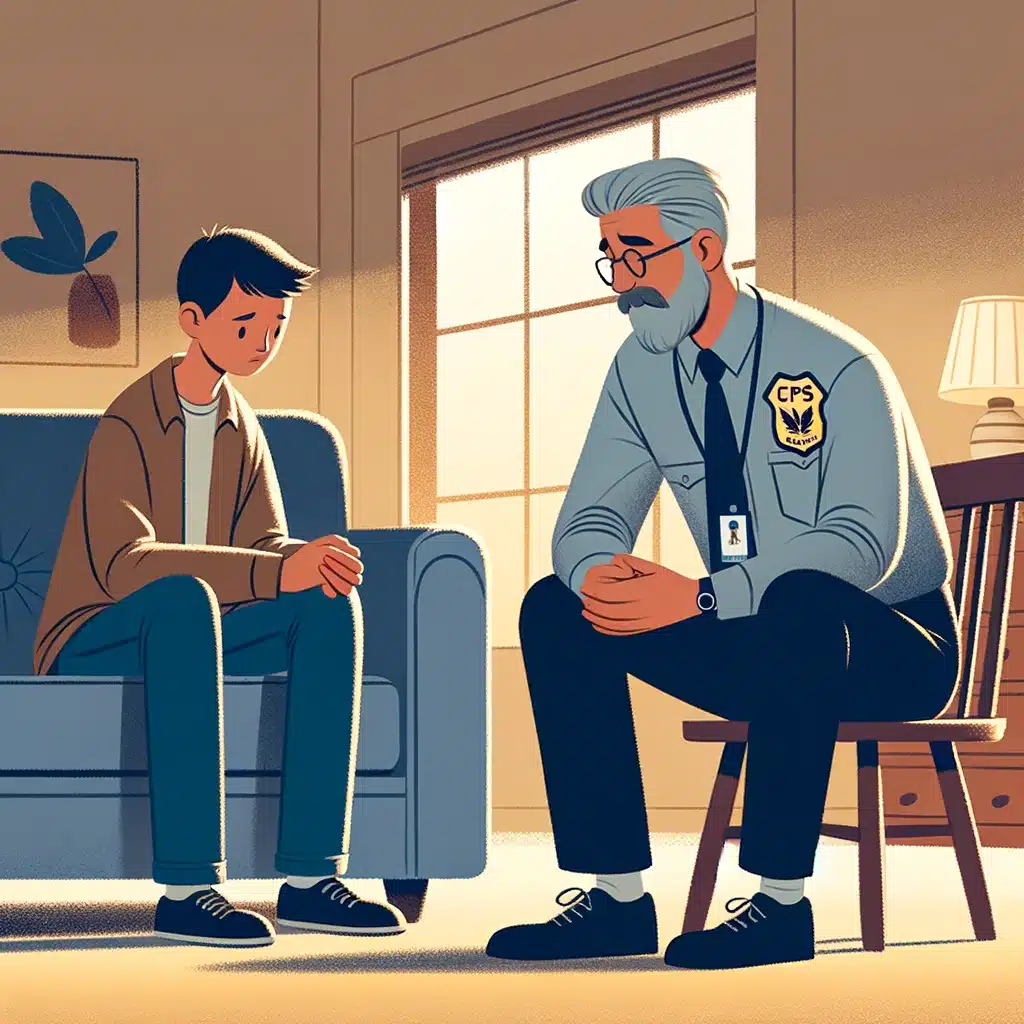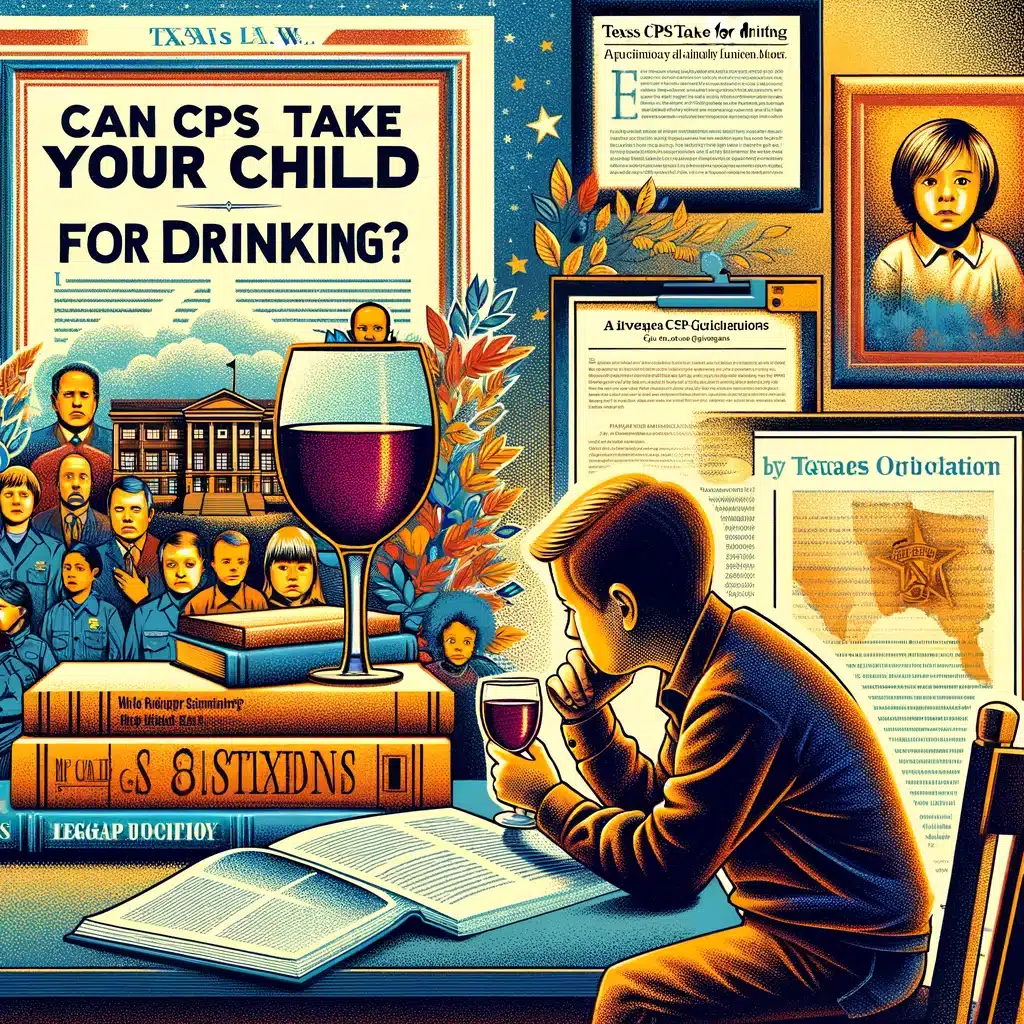Picture this: It’s Friday evening. The kids are tucked in bed, the house is finally quiet, and you’ve poured yourself a well-deserved glass of your favorite Cabernet. Suddenly, a thought flashes, “Can CPS take your child for drinking?” It’s a question that has likely never crossed your mind until now. After all, it’s just a glass of wine, right?
Well, here’s the scoop: Yes, you can indulge responsibly without triggering Child Protective Services (CPS) alarms. But the journey through this topic is far more intriguing than a simple yes or no. So, keep reading as we uncork the details together. By the end, you’ll not only have a crystal-clear answer but also a deeper understanding of when a personal indulgence can become a public concern. Grab your glass (responsibly, of course), and let’s dive into the world of “Can CPS take your child for drinking?” with a splash of knowledge and a hint of humor!

Unraveling the Mysteries of CPS: Understanding Their Role Over a Glass of Wine
At the Law Office of Bryan Fagan, PLLC, I’ve worked with many parents who find themselves suddenly entangled with Child Protective Services (CPS) in Texas. Navigating a CPS case can be overwhelming, often catching you off guard with a barrage of questions and concerns – akin to the surprise of a Champagne cork popping unexpectedly. Understanding how to stand up for yourself in a Texas CPS case is crucial in managing this challenging situation.

Child Protective Services (CPS) often casts a shadow of concern among parents, much like the unease felt upon discovering a treasured Chardonnay left out to warm. The real-world role of CPS, as opposed to the dramatized portrayals on television, can be complex and hard to grasp without firsthand experience.
This article aims to unravel the intricate role of CPS in safeguarding the children of Texas. If you’re unfamiliar with CPS, it’s likely you have many questions, particularly regarding “When CPS Doesn’t Follow the Law- what you should know” and “What is the threshold Test in a CPS investigation?” We’re here to shed light on these topics, offering clarity and insight into CPS’s objectives and how their procedures might impact you, your partner, and crucially, your children.
Join us as we explore these key aspects, empowering you with knowledge and insight. Our goal is to guide you through the complexities of CPS, helping you navigate these challenges far removed from the confusion akin to a dizzying wine tasting.
The Mission of Child Protective Services in Texas: Ensuring Child Safety and Well-Being
Under the auspices of the Texas Department of Family and Protective Services (DFPS), Child Protective Services (CPS) is dedicated to creating and upholding safe, healthy environments for families and communities across Texas. The primary objective of CPS is to ensure the safety and well-being of children.

CPS’s approach is to work in tandem with the existing network of caregivers, parents, and families that are integral to a child’s life. This collaborative effort extends beyond immediate family members; CPS actively engages with other adults in the child’s life. This engagement serves a dual purpose: it is a means to assess the child’s environment and a strategy to educate and underscore the importance of maintaining a safe and healthy environment for children.
CPS’s mission is deeply rooted in empowering families and communities, highlighting the importance of safety and well-being as the cornerstone of their work.
Navigating CPS Concerns: Understanding the Impact of Substance Abuse on Child Welfare
Substance abuse among parents is a reality in our society. If you’re struggling with substance abuse, it doesn’t define you as a bad or immoral person. However, it does raise significant concerns regarding the safety and well-being of your children. Substance abuse can impair your decision-making and parenting abilities, potentially putting your children at risk.

Child Protective Services (CPS) steps in when they receive reports (often through anonymous calls) alleging that a parent’s drug or alcohol use is endangering their child or involves child abuse. These reports might be unfounded or exaggerated, but CPS is obligated to investigate to ensure the child’s safety.
It’s crucial to understand that CPS’s role does not extend to taking responsibility for your actions or your journey towards recovery and sobriety. As a parent, you are the primary caretaker and guardian of your child, unless a court decides otherwise. It is your responsibility to seek help and improve both your physical and mental health. During any CPS investigation, it’s also important to engage your support network to ensure that your child is not continuously exposed to potential harm.
This article aims to clarify “Can CPS take your child for drinking?” and explain “How does CPS investigate drug abuse?” to help you better understand the implications of substance abuse on child welfare and CPS procedures.
Engaging with CPS: How Caseworkers Interact with Families
Upon initial contact by a Child Protective Services (CPS) caseworker, you’ll often find their approach to be professional and respectful. This is because CPS workers are trained to be keenly aware of the complexities and sensitivities inherent in their interactions, particularly with parents. They understand the critical importance of maintaining respect and patience, irrespective of the allegations at hand. This raises an important question: “Should you talk to CPS without a lawyer?” Knowing the best approach in these situations is crucial to navigating the process effectively.

During the initial meeting, a CPS caseworker will introduce themselves, clarify the purpose of their investigation, and provide their contact information. Their primary goal is to engage constructively with you and your spouse to address any issues concerning your child. The initial interactions between you, your spouse, and the caseworker are crucial as they set the tone for your ongoing relationship.
Your caseworker will emphasize the importance of your input, as well as that of your spouse and other significant adults in your child’s life. This collaborative approach is vital for the successful resolution of your case. The caseworker’s role is to work with you towards ensuring the well-being and safety of your child, considering all relevant factors and perspectives.
CPS Interactions with Children in Substance Abuse Cases
In cases where children live with parents struggling with substance abuse, it’s important for parents to be forthcoming if Child Protective Services (CPS) begins an investigation. Children are often acutely aware of their parents’ substance use; they may have witnessed, intervened, or even suffered indirectly due to a parent’s substance abuse, sometimes without the parent’s intention or recollection.

CPS takes a sensitive approach when interacting with children in these situations. Their primary goal is to understand the child’s perspective on the family environment and the substance use within it. CPS caseworkers will engage with the child to discern their views on substance use, whether as a means of celebration or coping with stress.
Children’s observations and experiences can significantly shape their attitudes towards substance use. If a child appears to have a familiarity or comfort with the effects of drugs and alcohol, this can indicate to CPS caseworkers the extent of openness about substance use in the home. CPS’s engagement with the child is crucial to assessing the child’s understanding and experience of substance use, and the overall impact of the family’s situation on the child’s well-being.
Key Considerations for CPS When Interviewing Children
When Child Protective Services (CPS) interviews a child as part of an investigation, several critical factors are taken into account to ensure the child’s comfort and the effectiveness of the interview. These include:
- Child’s Age and Developmental Stage: CPS caseworkers carefully consider the child’s age and developmental level. This assessment helps in framing questions that are age-appropriate and understandable to the child, ensuring that the child can meaningfully engage in the conversation.
- Sense of Self-Awareness: The child’s self-awareness is another important factor. This involves understanding the child’s perception of their situation and their ability to articulate their experiences and feelings.
- Building Trust: CPS caseworkers strive to establish a rapport with the child, creating a safe space for them to share their experiences. Building trust is a crucial aspect of the interview, as it encourages the child to communicate openly and honestly.
- Observing Behaviors: The caseworkers are trained to interpret the child’s behaviors, which can be significant indicators, especially in cases where the child may be less verbal. Behaviors can provide insights into the child’s emotional state and experiences at home.
- Identifying Trauma: CPS is attentive to signs of trauma that may be related to substance abuse in the household. They recognize that even subtle signs can be indicative of deeper issues.
- Assessing Child-Parent Relationship: Questions may be designed to understand the nature of the child’s relationship with their parent(s). This helps CPS evaluate how the parent’s substance abuse might be affecting the child, both emotionally and in terms of their safety.
- Gauging Impact of Substance Abuse: The interview aims to uncover the extent and impact of the parent’s substance abuse on the child. This includes understanding how the child perceives and is influenced by the substance use in their environment.
These factors collectively guide CPS in conducting sensitive and effective interviews with children, ensuring that their well-being and safety are thoroughly assessed.
Understanding CPS Actions: The Implications of Parental Drinking
The question “Can CPS take your child for drinking?” is a complex and pressing concern for many parents. This topic is fraught with emotional and legal complexities that can feel overwhelming.

Legal Rights and CPS: What Parents Should Know
It’s essential to be aware of your legal rights when interacting with Child Protective Services (CPS). If you find yourself under CPS scrutiny, knowing your rights can provide clarity and confidence. Firstly, you have the right to legal representation. An attorney can navigate the intricacies of the legal system and ensure your perspective is adequately represented.
Additionally, you have the right to deny CPS entry into your home without a warrant. It’s also crucial to be present at all court hearings related to your case. Empower yourself with knowledge and understanding of your legal rights.
Demystifying the CPS Investigation Process
When CPS receives a report, it initiates a structured process. The first step often involves an initial contact, such as a home visit, followed by interviews with you, your child, and other pertinent individuals. This process is thorough and may include various assessments to understand the situation better.
If CPS deems it necessary, this process can lead to court proceedings. It’s important to understand that the primary aim of CPS is to ensure the child’s safety and well-being. Knowing the steps involved in a CPS investigation can help you navigate the situation more effectively and respond appropriately.
|
Step Number |
Process of CPS Investigations |
|
1 |
Report Received: CPS receives a report of potential child abuse or neglect. |
|
2 |
Preliminary Review: CPS reviews the report to determine if an investigation is necessary. |
|
3 |
Investigation Initiated: If necessary, CPS initiates an investigation. This can include interviews with the child, parents, and other relevant individuals. |
|
4 |
Home Visit: CPS may conduct a visit to the child’s home to assess the living conditions and safety of the environment. |
|
5 |
Case Decision: Based on their findings, CPS makes a decision. This can range from closing the case if no evidence of abuse or neglect is found, to implementing a safety plan, or even removing the child from the home in extreme cases. |
|
6 |
Court Proceedings (If necessary): If the child is removed from the home, a court hearing will take place to determine the best course of action moving forward. |
|
7 |
Follow-up Services: Depending on the outcome, CPS may provide or recommend services such as counseling or substance abuse treatment for the parents. |
Substance Abuse and Child Welfare: The Hidden Impact
Substance abuse, including alcohol, can profoundly impact child welfare. This goes beyond the immediate physical effects. The psychological and long-term developmental implications are substantial. Substance misuse can lead to neglect, poor living conditions, or even physical harm. It’s a sobering reality that underscores the importance of addressing the issue.
Seeking Help Amidst Substance Abuse: Ensuring Child Safety in Texas
Battling substance abuse can be a daunting challenge, but it’s vital to remember that there are numerous avenues for assistance. This includes state-provided services, community organizations, and various treatment programs. It’s crucial to understand that reaching out for help is not a sign of weakness; rather, it’s a brave and responsible step towards creating a safer and healthier environment for your child. In this context, it’s also important to be aware of the consequences of certain actions, such as “What Happens If You Run From Cps In Texas,” and to make informed decisions that prioritize your child’s well-being.
What Comes Next? Possible Outcomes of CPS Involvement
The outcome of a CPS investigation varies. It could result in a child’s removal, foster care placement, or, in extreme cases, termination of parental rights. These outcomes are sobering, but they highlight the seriousness of the issue at hand.

Navigating the CPS Investigation: Advice for Parents
Cooperating with the investigation is essential. Seek legal counsel, be transparent, and take proactive steps towards sobriety. Your actions during this time can significantly influence the outcome of your case.
Confidentiality and Reporting: A Delicate Balance
Reporting to CPS is confidential. This is designed to protect those who make reports and ensure that individuals can speak up without fear of retaliation. However, false allegations can carry serious consequences.
The Court’s Role in CPS Cases: An In-Depth Look
The court system plays a crucial role in CPS cases. Court hearings can be daunting, but understanding their purpose can alleviate some stress. The judge’s role is to assess the evidence and decide in the child’s best interest.
Prevention and Education: The Key to a Better Future
Preventing substance abuse and educating parents about its impact on children is crucial. Parents can make informed decisions about their behavior by understanding the risks and consequences.
Behind the Scenes: CPS Training and Qualifications
CPS workers undergo extensive training to handle complex cases involving substance abuse. Their qualifications equip them to navigate these situations and make decisions that prioritize the child’s safety.
“Can CPS take your child for drinking?” is a multifaceted question. It involves legal rights, investigation processes, and a myriad of potential outcomes. But with the right resources and support, parents can navigate this challenging time and take steps towards a better future for themselves.
Emergency Custody Motion in Texas
In Texas family law, the Emergency Custody Motion serves as a vital tool for ensuring the immediate safety and well-being of children. This legal recourse can be employed in situations where a child’s life or health is at risk due to immediate danger, health concerns, removal without consent, or even cases of abduction or kidnapping.
The process involves filing a formal petition, presenting compelling evidence to support the need for emergency custody, attending a court hearing, and ultimately receiving temporary orders that address the urgent situation. It’s imperative for parents and legal guardians to understand the significance of Emergency Custody Motions and seek guidance from a family law attorney when faced with critical circumstances that necessitate swift legal action to protect the child.
Can CPS Take Your Child for Drinking: Understanding the Law in Texas
If you’ve ever found yourself pondering the question, “Can CPS take your child for drinking?” while sipping on a glass of wine, you’re not alone. It’s a concern that many parents may have, especially when it comes to Child Protective Services (CPS) and their role in safeguarding children’s welfare. In this article, we’ll dive deep into this complex topic, explore the CPS drug testing law in Texas, and shed light on what parents should know about CPS involvement related to substance abuse.

The First Sip: Can CPS Take Your Child for Drinking?
The short answer to the question “Can CPS take your child for drinking?” is: It depends. The nuances of this issue go far beyond a simple yes or no. Let’s explore this topic further.
CPS and Substance Abuse
CPS, operating under the Texas Department of Family and Protective Services (DFPS), is tasked with ensuring the safety and well-being of Texas families and communities. Their goal is to work within the existing framework of caregivers, parents, and families to create a safe environment for children.
However, when substance abuse becomes a concern, CPS may intervene. This intervention typically occurs when anonymous intake phone calls report that a parent’s use of drugs or alcohol poses a danger to their child. These reports can sometimes be misleading or even false. Nevertheless, CPS has a legal obligation to investigate and ensure the child’s safety.
Responsibility Lies with the Parent
It’s important to note that, until a court intervenes and dictates otherwise, parents remain the primary caregivers and conservators of their child. CPS does not assume responsibility for a parent’s actions or their recovery efforts. As a parent struggling with substance abuse, it is crucial to take charge of your well-being and work towards physical and mental improvement. Enlisting the support of available resources is essential to ensure your child’s safety during any CPS investigation.
CPS Engagement with Parents
When CPS initiates contact with a parent, caseworkers are trained to approach the situation with respect and professionalism. They understand that this process is challenging for parents and aim to provide clear explanations of their roles and the investigative process. Successful resolution of a case often hinges on effective communication between parents, their spouses, and CPS caseworkers.
Engaging with the Child: Understanding the Impact
Children in families with substance abuse issues are unfortunately exposed to these challenges. It’s vital for parents to realize that children are not immune to the effects of substance abuse, even if unintentional. When CPS engages with a child, they aim to understand the child’s perspective on substance use and its role in their family life.
Factors Considered by CPS
CPS takes into account several factors when interviewing a child, including the child’s age, developmental stage, and self-awareness. The caseworker’s goal is to build trust with the child and create an environment where they feel safe sharing their experiences in the home.

CPS caseworkers are acutely aware that a child’s behaviors, even if seemingly subtle, can reveal underlying issues. Substance abuse can lead to trauma for a child, impacting their relationship with their parents. CPS uses these interviews to gauge the strength of the parent-child relationship and the extent of substance abuse’s effects.
Signs of Substance Abuse: Early Intervention Matters
Recognizing signs of substance abuse is crucial for parents and caregivers. Early intervention can help prevent CPS involvement and protect the child’s welfare.
Legal Representation: Your Right to an Attorney
When dealing with CPS investigations, it’s essential to understand your rights as a parent. You have the right to legal representation. An attorney experienced in child welfare cases can guide you through the complex legal process and ensure that your voice is heard.
Safety Plans: Addressing Concerns without Removal
Safety plans are valuable tools that can help address CPS concerns without the need to remove the child from the home. Understanding how to create and implement a safety plan can be crucial in navigating CPS investigations.
|
Aspect |
Description |
|
Safety Plan Definition |
A safety plan is a written agreement that outlines steps to ensure a child’s safety while addressing CPS concerns. |
|
Purpose |
To maintain the child’s well-being without the need for immediate removal from the home. |
|
Key Components | – Identification of potential risks – Strategies to mitigate risks – Emergency contact information<br> – Timelines for plan implementation |
|
Parental Cooperation |
Parents are encouraged to actively participate in creating and following the safety plan. |
|
Caseworker’s Role |
CPS caseworkers may assist in developing the plan and monitor its implementation. |
|
Monitoring and Review |
The safety plan is regularly reviewed to assess its effectiveness in ensuring the child’s safety. |
|
Temporary Solution |
A safety plan is a temporary solution to address immediate concerns and prevent removal while addressing underlying issues. |
This table provides a clear overview of what a safety plan is, its purpose, components, and the roles of both parents and CPS caseworkers in its implementation and monitoring.
Parenting Classes and Counseling: A Path to Improvement
For parents struggling with substance abuse, parenting classes and counseling services are available to help improve parenting skills and address underlying issues. Seeking support is a courageous step towards providing a safer environment for your child.
Child Advocacy Services: Protecting Children’s Rights
Mentioned organizations and agencies offer advocacy services for children involved with CPS. These services ensure that children’s needs and rights are protected throughout the process, giving them a voice in their own welfare.
Impact on Children: Addressing Long-Term Effects
CPS involvement can have long-term emotional and psychological effects on children. Parents should be aware of the potential trauma and work to mitigate these effects through support and communication.

False Reports: Defending Against Accusations
False reports to CPS can occur, and there can be serious consequences for those who make false allegations. It’s essential for parents to know how to defend against false accusations and protect their rights.
Rehabilitation and Treatment: Seeking Help
Parents struggling with substance abuse should seek help through rehabilitation and treatment options. This step is crucial for their own well-being and their ability to provide a safe environment for their child.
Foster Care: Understanding the System
Foster care can be a temporary placement for children involved in CPS cases. Understanding how the foster care system works and what parents should know about it is essential.
Family Reunification: Navigating the Process
For families separated due to CPS involvement, the process of reunification can be complex. Parents can take steps to expedite the reunification process and ensure a smoother transition for their child.
In Conclusion
So, there we have it, folks! We’ve sipped our way through the heady topic of “Can CPS take your child for drinking?” We’ve braved the legal storm, untangled the procedural web of CPS investigations, and peered into the sobering impact of substance abuse on child welfare.
Remember that Friday night scenario we began with? The quiet house, the sleeping kids, the wine? The good news is, enjoying that well-earned glass of Cabernet isn’t likely to prompt a knock on the door from CPS. However, when substance use starts to cloud your role as a parent, that’s when CPS might start taking notes.
But fret not, because just like a good wine, parenting is all about balance. So, here’s to a future filled with understanding, support, and, of course, a little wine. May your parenting journey be as smooth and delightful as a perfectly aged bottle, and may you always find the harmony between sipping responsibly and nurturing your child’s well-being. Cheers to a brighter and more balanced tomorrow!
Other Articles you may be interested in:
- What to Do When CPS Asks for a Drug Test in Texas
- CPS and how The Law Office of Bryan Fagan can help
- Take control of your child’s CPS case by following these tips
- How to stand up for yourself during a Texas CPS case
- How to prevent a second CPS investigation after your first concludes
- Family Law Cases in Texas: The final stages of a CPS case
- When can CPS remove your child from your home in Texas and what can you do about it?
- What to do if you no longer like your CPS service plan?
- In what circumstances could your child end up living with your relative during a CPS case?
- What can a CPS investigation into your family mean now and in the future?
- What to do if your spouse is being investigated by CPS in Texas for abuse or neglect of your child?
- Can CPS photograph your house and request your child’s medical records in Texas?
- What Happens If You Run From Cps In Texas
Frequently Asked Questions
How does parental addiction affect child development?
Answer to the question about how parental addiction can impact child development.
What CPS can and Cannot do in Texas?
Answer to the question regarding the powers and limitations of Child Protective Services in Texas.
What is the role of parents in addiction?
Answer to the question discussing the role of parents in dealing with addiction issues.
What if CPS doesn’t do anything?
Answer explaining the steps to take if Child Protective Services does not take action when needed.
What does CPS look for in a home visit in Texas?
Answer detailing what Child Protective Services typically examines during a home visit in Texas.
What are the 4 types of child neglect?
Answer explaining the four types of child neglect recognized in child protection services.
Bryan Fagan, a native of Atascocita, Texas, is a dedicated family law attorney inspired by John Grisham’s “The Pelican Brief.” He is the first lawyer in his family, which includes two adopted brothers. Bryan’s commitment to family is personal and professional; he cared for his grandmother with Alzheimer’s while completing his degree and attended the South Texas College of Law at night.
Married with three children, Bryan’s personal experiences enrich his understanding of family dynamics, which is central to his legal practice. He specializes in family law, offering innovative and efficient legal services. A certified member of the College of the State Bar of Texas, Bryan is part of an elite group of legal professionals committed to ongoing education and high-level expertise.
His legal practice covers divorce, custody disputes, property disputes, adoption, paternity, and mediation. Bryan is also experienced in drafting marital property agreements. He leads a team dedicated to complex family law cases and protecting families from false CPS allegations.
Based in Houston, Bryan is active in the Houston Family Law Sector of the Houston Bar Association and various family law groups in Texas. His deep understanding of family values and his professional dedication make him a compassionate advocate for families navigating Texas family law.




